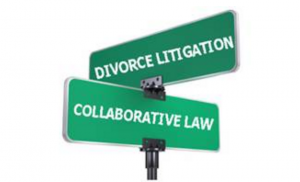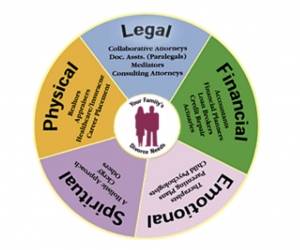In recent years there has been a push for more alternative and non-confrontational avenues in handling and resolving Family Law Complex issues; avenues in which both parties are able to negotiate and compromise. One of the options that is being used more frequently is Collaborative Law. Collaborative Divorce can be used for issues such as but not limited to:

- Child custody and visitation
- Child and spousal support
- Division of marital property
- Changes to existing arrangements
Collaborative divorce is different than a divorce, which goes to court. The process often includes input and support from outside experts such as divorce coaches, child psychologists, and financial planners. The goal is to get both parties working together to resolve their differences without resorting to litigation.
At Bliss Law Group, we receive many questions about collaborative law and how it works. We’ve compiled a list of some of the most common questions but of course feel free to reach out to us directly if you would like more information:


How does a collaborative law negotiation work?
Negotiations take place via a succession of meetings between you, your spouse, and your attorneys, who act as facilitators and encourage constructive communication. In addition to providing legal advice and resolution options, both attorneys will help keep the discussions focused on problems and solutions.
You and your spouse are required to make a complete and honest disclosure of finances and other important details needed for informed decision-making. You must also commit to treating each other with courtesy and respect.
If a couple reaches an agreement in the process, that agreement is then compiled into the final documents so it is enforceable.
What if my spouse and I can’t communicate?
It is not unusual for divorcing spouses to have such serious communication issues that they don’t even speak to each other. Your attorneys will coach each of you about ways that you can communicate properly with the other, and remain present during negotiations to defuse any conflicts that may arise.
What other professionals are involved in a collaborative law matter?
It depends on what issues need to be discussed and agreed upon. For example, if you have children, you may want to retain a psychologist or social worker to assist you in resolving custody and visitation matters. In most cases you will want to work with accountants and financial planners to help with income and tax-related decisions, and experts such as real estate appraisers and business valuators can help assign a value to assets that must be divided.
How does the collaborative process differ from mediation?
Mediators are neutral parties who assist both sides in working out a settlement. They do not provide legal advice or act for either party. You are able to have independent counsel in a mediation but it is not mandatory. In a Collaborative Divorce situation, you are required to retain counsel but will also have the input and guidance of the professional experts that are present.
What if we can’t reach a settlement using collaborative methods?
If one or both of you decide that you have reached an impasse and want to litigate the matter instead, your attorneys must resign from the case and you will have to retain new representation.
If you and your spouse believe that the collaborative route is the best way to reach a fair divorce settlement, contact Bliss Law Group today. We have years of professional training and experience in collaborative law and welcome the prospect of working with you.

